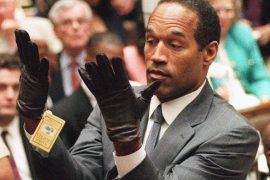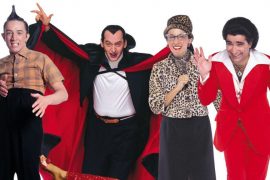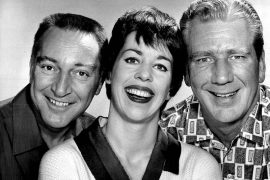“If Jonathan Winters is ever accused of anything, he’s got the perfect alibi,” Jack Paar once told his audience. “He was someone else at the time.”
Winters was a wonder on television, unlike any other comedian in that he never told jokes, he just inhabited characters. Not crazy, made up characters either, but astoundingly real, three dimensional beings with back stories and front stories. Folks you could recognize even as they sprang from Winters’ nimble mind.
Seeing him on a talk show like Paar’s or Steve Allen’s or Johnny Carson’s Tonight or on Dean Martin’s variety show or The Hollywood Squares was always a trip to somewhere unexpected. He was the ultimate late night talk show guest because he was so gifted and unpredictable, and continued to make appearances with David Letterman, Jay Leno, Jimmy Kimmel and Craig Ferguson.
There are already headlines circulating out there on Facebook that it’s a sad, sad, sad, sad, world now that.Winters, who died Thursday, has passed away at 87. Winters was one of many of the TV and film comedians crammed into Stanley Kramer’s marathon misfire It’s A Mad, Mad Mad Mad World (1963), but he’s better in Norman Jewison’s more interesting 1966 Cold War comedy The Russians Are Coming, The Russians Are Coming.
Others know him best as the odd alien son in the final season of Mork & Mindy. Robin Williams was a big fan and thrilled to have him in his playpen, although the collaboration held more promise than it delivered. Fact was, Winters was a sore thumb in scripted comedy, no matter how much leeway he had to improvise in his roles. His world was inside his head and he really only shone in situations where he could tap into it as a single. He did this in many TV ad campaigns–most memorably for Good Humor ice cream, Hefty Bags and Wendys–where he seemed to delight as a commercial spokesman and deconstruct the whole process all at the same time. Even though he was from Dayton, Ohio, his humour could be said to be very Canadian in some ways–heavy on the improv, a bit to one side, friendly and dark all at once.
I saw him at a couple of TCA press tours, one way back in the early ’90s when he was starring in the short-lived Randy Quaid sitcom David Rules. In 2000, he was asked why he never did another sitcom after that and his answer was “because the writing.” Winters said he would get his lines on a Monday, “and Tuesday you’re walking around with it. Wednesday, you ought to have it.” By Wednesday or Thursday, however, he would start tinkering with his lines. “And I’m not a troublemaker. I wasn’t a troublemaker. I didn’t come in bombed or full of drugs or sauce. I came in to work and do a show and have some fun, ‘But you got to give me an opportunity to have some fun for Christ’s sake. I’m not having any fun here.’
“And on Friday, the head writers says, ‘Dammit, just do the lines. Just do the lines. If it doesn’t work, we’ll sweeten it.’ And that’s where we are. Canned laughter. You don’t get canned laughter in the movies. You don’t get canned laughter, certainly, in the theatre. You get it in the sitcoms.”
He made those comments at a PBS TCA press tour session I attended promoting Jonathan Winters on the Loose, a salute to the comedian made in 2000. He was much older and less energetic by then, and the sadness he always held at bay in those early appearances seemed more present. Older critics still help him in awe, aware of all that he did, and humbled by the fact that he was that rarest of TV stars–an original.
One of those veteran critics, Ken Tucker, does a wonderful job remembering Jonathan Winters here at The Daily Beast.

Next Post






